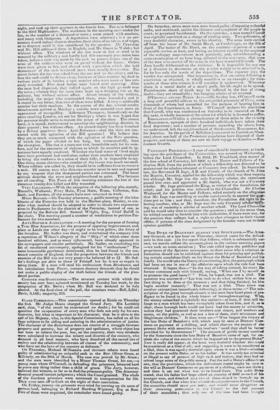CLARE COMMISSION.—This commission opened at Ennis on Thursday the 2nd.
Mr. Judge Moore charged the Grand Jury. His Lordship said, that, "of the result he entertained no doubt ; for he could not question the co-operation of every man who feels not only for his own interests, but what is important to his character, that he is alive to the call of his Majesty, who, in this Special Commission, has called on all his liege subjects to be aiding and assisting in the administration of justice. The character of the disturbance does not consist of a struggle between property and poverty, but of property and spoliators, whose object has not been to relieve the poor, but, on the contrary, their very misdeeds were calculated to increase the misery and distress of the country, who dictated in all local matters, who have dissolved all the sacred ties of Society and the relationship between all classes of the community, and who have set the laws of the country at defiance." On Thursday, Michael. M‘Namara and thirteen others were found guilty of administering an unlawful oath to the Rev. Oliver Grace, at Xilkeady, on the 30th of March. The case was proved by Mr. Grace; and the men were identified by a Mister Thomas Grace, his son,—a young man whom O'Connell, in defending the prisoners, laboured hard to prove any thing rather than a child of grace. The Jury, however, believed the witness, so far as to find the prisoners guilty. The Attorney. General prayed instant judgment; which the Court granted. The whole 4If the fourteen prisoners were sentenced to transportation for life. They were sent off to Cork on the night of their conviction.
On Friday, twenty-six prisoners were tried for turning up six acres of pasture land, belonging to Richard Harding Wigmore, Esq. at Ross. Five of them were acquitted, the remainder were found guilty.
On Saturday, seven more men were found guilty of imposing unlawflal oaths, and sentenced, amidst the clamour and complaint of the people in court, to perpetual banishment. On the same day, a man named Carroll was capitally convicted on a charge of stealing arms. Two policemen, or very doubtful character, swore to his identity. The arms were carried off from the house of Mr. Smith Blood, at Castlefergus, on the 8th of April. The butler of Mr. Blood, on the contrary—a person of a more reputable station at least, and having no interest earthly in the acquittal of the unhappy man—swore most positively, and, notwithstanding a crosaextunination of an hour long, adhered to the statiiment, that none of the men who carried off the arms in the least resembled Carroll. The Jury hardly deliberated on the evidence. It is impossible for any one at a distance to determine on the precise weight to be attached to it, for he has only the words of the depositions. The reporter says the verdict was unexpected. Our impression is, that execution following a conviction so obtained, is wholly worthless as an example ; for nine- tenths of those who witness it will consider it undeserved. Wherever there is a moral doubt of a man's guilt, his life ought to be spared. Punishments short of death may be inflicted in the face of strong doubt—they are remediable ; hunt hanging admits of no reversal. O'CONNELL AND TILE TERRY ALTS.—On Sunday last, O'Connell made a long and powerful address to the misguided peasantry of Clare, some thousands of whom had assembled for the purpose of hearing him in front of the Court-house, at Ennis. O'Connell declares his conviction that Carroll, who was condemned on Saturday to be executed on Mom- day next, is wholly innocent of the crime for which he is doomed to suffer. Emma:sato:a—Within a circumference of three miles in the vicinity of Roscommon, upwards of three hundred individuals have taken their final departure ; and a number of persons, exceeding the above, have, we understand, left the neighbourhood of Stnikestown, Roscommon, Scr. for America. In the parish of Killuken (convenient to Carrick-on-Shan- non) about one-half of the Protestant population have disposed of their property, and many of them are now on their voyage to America.—Res- common Gazette.


























 Previous page
Previous page